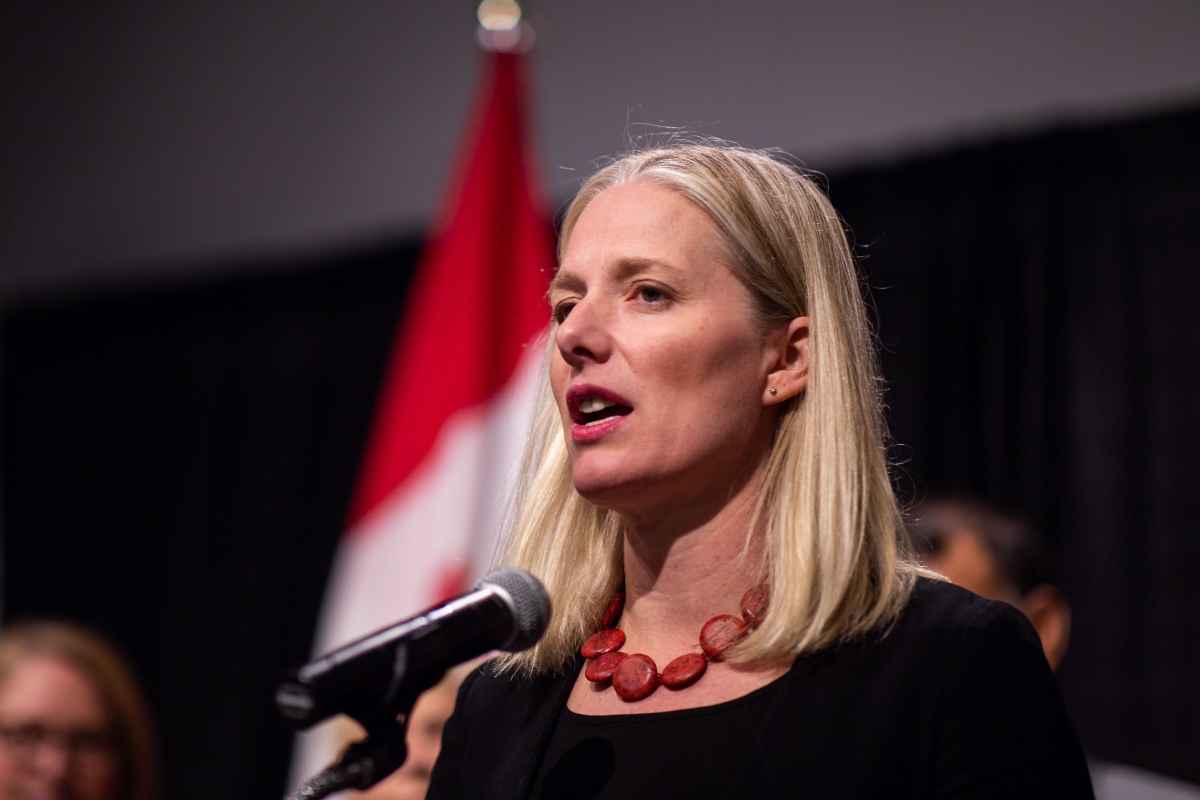Support strong Canadian climate journalism for 2025
Federal Environment and Climate Change Minister Catherine McKenna is proposing to create a new scientific advisory panel with British Columbia to address concerns about the environmental risks of the Trans Mountain pipeline expansion project.
McKenna made the proposal in a new letter released on Thursday that was addressed to B.C. Environment Minister George Heyman.
The threat of diluted bitumen spills has been flagged as a major concern by scientists, First Nations and British Columbia. Bitumen is the tar-like heavy oil produced by Alberta's oilsands companies, which support the west coast Trans Mountain pipeline since it would allow them to reach new markets.
"I understand that our senior officials have met a number of times over the past few months to provide further clarity and information on the Oceans Protection Plan, and on the science, including diluted bitumen, to discuss areas of concern to British Columbia, and to consider possible solutions," McKenna wrote in the letter.
"In this context, we remain open to explore those solutions further – such as examining ways to ensure more effective towing capacity on the West Coast, or to strengthen loss and damage provisions under rail safety legislation."
McKenna's department called for more research on bitumen spills in January 2016
McKenna's latest proposals come more than two years after her own department had recommended more research and access to information in its final submission to a National Energy Board (NEB) panel that was reviewing the Trans Mountain project. The department also suggested that the government add a condition to the approval of the pipeline to ensure that the proponent, Texas-based Kinder Morgan, would be required to cover the costs of this research needed to ensure public health and safety and address the "knowledge gaps and uncertainties with respect to hydrocarbon product behaviours" in water.
"Response effectiveness and human health and safety will be compromised unless appropriate information is readily and immediately available to responders in the first few hours under emergency response conditions," the department said in the January 2016 submission to the NEB. "Generic names representing groups of oil products with different properties... are inadequate for guiding safe and effective spill response."
Independent scientists from different Canadian and American universities also sent Prime Minister Justin Trudeau a peer-reviewed scientific assessment paper that warned him of "large unexamined risks to the marine environment" from oilsands products, less than two weeks before the federal government announced that it had approved the Trans Mountain project on Nov. 29, 2016.
Public servants rushed to dispute the findings in the days before the approval was announced. But several federal employees involved in the internal discussions have spoken to National Observer on condition of anonymity about how a high-ranking public servant instructed them, during an Oct. 27, 2016 meeting in Vancouver, to find a "legally-sound basis to say 'yes,'" to the Trans Mountain project. These public servants have also said that they were discouraged from raising concerns about the evidence.
Carr, who was not in the room during the October 2016 internal meeting, told iPolitics outside the House of Commons on Thursday that there were "no directions" given to force public servants to approve the pipeline.
Moments later in the House of Commons, he used slightly different language after being asked about it again by NDP Parliamentary Leader Guy Caron, instead saying that the government had engaged in "historic consultations" and had released thousands of records about the process.
"In late October 2016, weeks before the pipeline's public approval, assistant deputy minister Erin O'Gorman of the Department of Natural Resources instructed her staff to, 'give cabinet the legally-sound basis for saying yes to Kinder Morgan's pipeline,'" Caron said in the Commons. "However, only minutes before, First Nations representatives were assured by federal officials that the government had not made a decision on the pipeline. None of the six organizations that were present actually denied that O'Gorman gave those instructions. Is the minister denying it?"
Carr said the government was making information available about what happened.
"As a matter of fact, if they want to go to the NRCan website, they will see literally thousands of emails and opinions that have been offered," Carr told the Commons. "Therefore, why would the honourable member not just access what was actually done rather than what he is alleging was said, and he will know that this was the most exhaustive consultation on pipelines (in Canadian history)."
Caron and other NDP MPs have been pressing Trudeau and his cabinet in the House of Commons to respond to the allegations reported by National Observer for three days in a row.
Trans Mountain is 'vital infrastructure,' says McKenna
McKenna also told reporters on Thursday that she was taking the unusual step of sending an open public letter to Heyman because she believed the B.C. government was downplaying the environmental measures implemented by the federal government.
"Should your government wish to further collaborate on science, we could consider establishing a joint Scientific Expert Advisory Panel," she wrote in the letter to Heyman. "Such a panel would build on our science investments and results, take stock of work on the fate, behaviour, and effects of various oil products in different spill conditions and under extreme Canadian climates in order to inform further scientific work under the OPP and spill response modelling, preparedness and response measures. Such a panel would be made up of independent experts, be national in scope, and examine all types of petroleum products."
McKenna's letter also reiterated to Heyman that the Trudeau government intends to proceed with its support for the Trans Mountain project, since it considers it to be "vital infrastructure" that is in Canada's national interest.
"We are dedicated to ensuring that Canada’s resources are developed in a way that is informed by rigorous science and evidence, aligns to Canada’s climate change plan, protects Canada’s rich natural environment, including our oceans, respects the rights of Indigenous Peoples, and supports our economy. Our priority remains to effectively advance both Canada’s economic progress and our environmental responsibilities," she wrote.
The letter was posted online ahead of an anticipated announcement by the B.C. government explaining how they will ask B.C.'s Court of Appeal to clarify the province's powers to protect its environment and economy from an oil spill through regulations to restrict the transportation of bitumen.
Editor's note: This story was updated at 5:30 p.m. ET on April 26 with additional comments from Carr and McKenna, as well as background information from Environment and Climate Change Canada.






Comments
Well this is all bullshit, unless she intends to assemble the scientists who wrote the letter about the unacknowledged dangers, prior to the Liberal government approving the pipeline.
We need to remember, that anyone can claim to represent science, be on the side of the scientific evidence: Friends of Science do it all the time, and they are a climate denial organization.
We need to also acknowledge that more information won't protect our coasts any better than 1.5 billion spread out over a number of years....and divided among ALL our coastlines, will protect our north Pacific from a bitumen spill.
So write those letters, make those promises....take baby steps phasing out coal....
It's only PR and cover your ass work Science isn't magic; nor is it done by corporate shills eager to convince us that it is.
If a truly independant scientific panel was allowed to consider the effects on climate change it would with certainty recommend against the pipeline and corresponding expansion of bitumen sands mining.